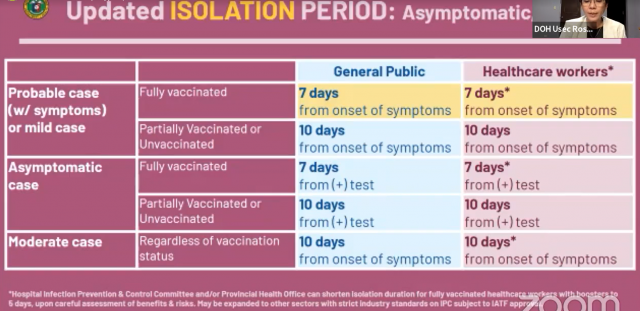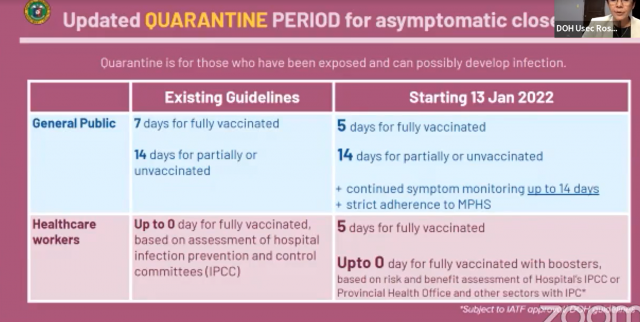DOH bares policies cutting quarantine time for COVID-19 cases, close contacts
The Department of Health (DOH) has disclosed policies cutting the isolation and quarantine periods for confirmed cases and close contacts amid the steeply increasing number of COVID-19 cases attributed to the Omicron variant.
In a Zoom presentation, DOH spokesperson Health Undersecretary Ma. Rosario Vergeire said the isolation period of fully vaccinated mild COVID-19 cases would be reduced from 10 days to 7 days from onset of symptoms.
The isolation period for fully vaccinated asymptomatic cases will be reduced from 10 to 7 days from their positive swab test result.

“Ten days isolation is retained for those that are partially or unvaccinated, and those with moderate symptoms regardless of vaccination status,” Vergeire said.
“Meanwhile, the isolation period has been retained to 21 days for those with severe and critical disease, and those immunocompromised,” she added.
On its slide on the updated isolation period, the DOH said the hospital infection and control committee and/or the Provinical Health Office can shorten isolation duration for fully vaccinated healthcare workers with boosters to 5 days, upon careful assessment of benefits and risks.
"May be expanded to other sectors with strict industry standards on IPC subject to IATF approval," it added.
Quarantine period
Vergeire said the quarantine period for fully vaccinated close contact of a COVID-19 patient would be shortened to five days from the previous seven days.
“For the quarantine of asymptomatic close contacts for the general public, policies are to be from seven days we shortened it to five days for those who are fully vaccinated, and we retained 14 days for partially or unvaccinated individuals,” Vergeire said.
A note on the slide on updated quarantine period said it was subject to IATF approval/DOH guidelines.

Asked if the policies presented were recommendations or proposals, Vergeire said, "We will issue the policy in the next days."
In her presentation, Vergeire said that testing of asymptomatic close contacts would also not be required unless symptoms developed.
“For healthcare workers that are considered asymptomatic close contacts, for the sake of uniformity they will follow the five days quarantine similar to the general public---provided they are fully vaccinated,” she said.
According to Vergeire, the DOH would also retain that the hospital prevention and control committees could further shorten the healthcare workers’ quarantine with boosters depending on the situations, risks, and benefits.
Reasons for update
Vergeire said the updated guidelines on the quarantine period was deemed necessary as the “the general public and specific sectors like health care workers had been causing confusion on the ground.”
She revealed that most of the cases remain to be asymptomatic and mild cases, adding that this showed the effectiveness of the vaccines against COVID-19.
Vergeire said patients who contracted the Omicron variant had milder symptoms than those acquired Delta variant.
“The prolonged quarantine and isolation duration has been causing strain to our healthcare system and our economy,” Vergeire said.
“Our health experts believed specifically in the Omicron variant the benefits of shortening the quarantine outweighs the risk,” she added.
The health undersecretary also cited that other countries were also updating its quarantine and isolation process.
“While the US CDC (Centers for Disease Control and Prevention) is the most aggressive example by bringing down their isolation and quarantine periods to five days, we also see other countries moving down from 14 to seven to 10 days,” she said.
“The updated policy of the Philippines attempts to find acceptable standards given our current context and allow more flexibility to groups and sectors that can strictly implement infection, prevention, and control procedures,” she added.
The Philippines on Wednesday registered 32,246 new COVID-19 infections, bringing the nationwide caseload to 3,058,634. —NB, GMA News




